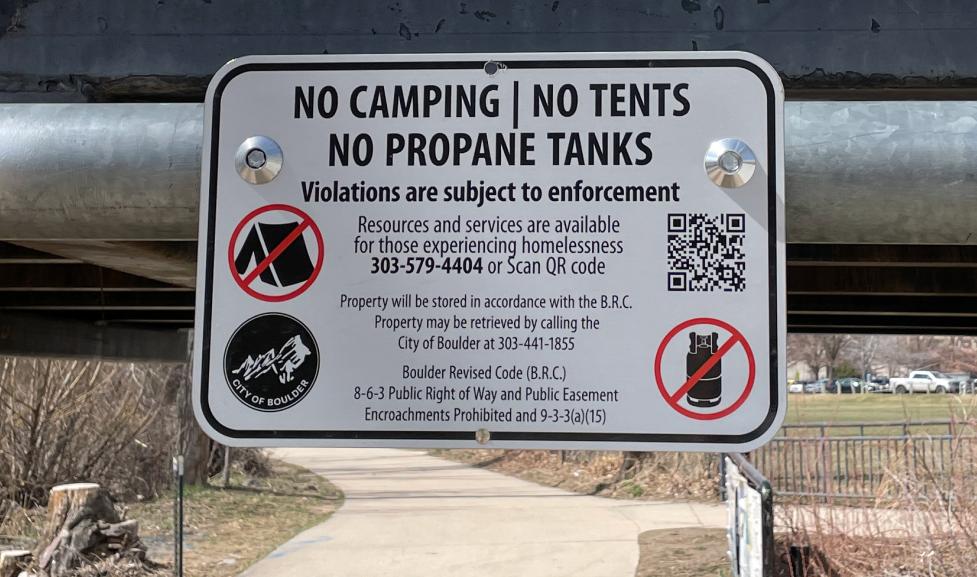Our Approach
The City of Boulder, like many communities throughout the country, struggles with homelessness. We work in partnership with Boulder County and area agencies to diligently provide services for individuals and families experiencing homelessness or trying to avert becoming unhoused.
It is important for us to be clear that individuals experiencing homelessness in public places is not the issue. However, the day-to-day living and belongings that some individuals are storing in the floodplain, public areas or rights of way pose a significant hazard and in many cases impede access for all the public to enjoy. These items are not permitted and are subject to immediate removal by the city. The city wants and needs to continue to address these instances.
Removal of an unsanctioned campground is done as a last resort when the occupants are resistant to services and refuse to vacate. Committed to compassion, we issue multiple soft notices in advance of a formal notice. With each round of notice, we attempt to engage people in resources. The cleanup day is the last step of a long process. Vacated residents may take their belongings with them, and city crews address any remaining items.
It is the policy of the City of Boulder to legally and compassionately prevent and disband unsanctioned campsites as quickly as possible to avoid harm to inhabitants, the broader community, as well as public spaces and natural resources. We hope the information on this page is helpful. This is a complex topic, and the city is spending considerable time and energy addressing it.
Schools, Sidewalks and Multi-Use Paths
After voters approved the Safe Zones for Kids initiative in the fall of 2023, the city modified its operational protocol to reflect the new ordinance language, which prioritizes removal of prohibited items located on city property within a radius of five-hundred feet from a school or within fifty feet of any multi-use path or sidewalk. Other measures related to the new ordinance include:
- Sign installation in problematic locations that are near schools and pathways; and,
- City staff do a weekly review of current conditions with the new ordinance language in mind to assess effectiveness and address adaptive behaviors.
These measures are in combination with other operational enhancements that began late summer 2023 and include:
- Fencing (west of Boulder High and at the Arboretum);
- Portable security cameras (civic area, north Broadway and others); and,
- Plans for minor infrastructure modifications in the civic area to discourage camping in underpasses.
The SAMPS team is currently operating under the new guidance and is seeing a reduction in camping behaviors around schools and paths, particularly in the Boulder High corridor. The team will continue to monitor and respond to this area as well as evaluating other community areas where schools and multi-use paths are impacted by revised code/ordinance provisions.
A Complex Topic
While it can be challenging to keep up with new unsanctioned campsites, we understand the importance of staying focused.
As we continue to leverage a team comprised of multiple city departments, nonprofit agencies, and a private contractor, we are also building additional internal capacity to better address unsanctioned campsite clean-ups and public space management. Our ability to leverage additional resources was made possible through a funding approval made by City Council last summer. This funding is supporting the creation of an internal clean-up team, as well as an increased presence that will involve a variety of personnel.
In July 2021, an emergency ordinance related to tents in parks and other city property, and the possession of propane tanks on public property was passed in an effort to address safety issues. This ordinance is a modification of the existing ordinance BRC 8-3-21. A period of education and warnings was conducted before enforcement began in mid-August. These additional tools were requested and designed by City Council to increase the effectiveness of the city’s efforts to promote safe and welcoming public spaces and disallow camping in public spaces.
Working Toward Meaningful Solutions
In addition to unsanctioned campsite removals, we do issue tickets to people for violating the city’s camping ordinance. The citations that bring them to court serve as an opportunity to get participants engaged. Sanctions are aimed at resolving a person’s unhoused status and are tailored to each individual’s needs. Sometimes the person needs something simple like help replacing a state identification card, and sometimes it can be something complex like getting a person ready for housing. Often, their actions result in dismissal of the charge(s).
Our data shows that the community court model is working. From Oct. 1, 2020 – Dec. 31, 2021, 144 people with 504 cases were seen in community court. Over 525 tasks or sanctions were ordered, and 454 of those were completed, which amounts to a completion rate in excess of 86%. In some cases, these assignments are completed at court. BUT prior to community court, sanctions such as traditional community service were completed less than 10% of the time and often landed individuals in jail, which did not address the root cause of the original crime.
For the unhoused community as a whole, success means the criminal and human services systems are working together in a seamless way. When we can address the underlying issues causing homelessness, then we are going to have a safer community.
We believe the single best solution to homelessness is providing housing. The City of Boulder’s Homelessness Strategy was developed as part of a larger countywide partnership involving Homeless Solutions for Boulder County (HSBC), a collaboration between the City of Boulder, City of Longmont, and Boulder County. The collaborative takes an approach from national best practices, which have demonstrated that housing is the most effective intervention. Options for people experiencing homelessness vary based on their level of need.
